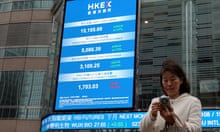One of China’s biggest financial conglomerates with links to the country’s ailing property market has admitted a shortfall of nearly £30bn as it warned investors that it is “severely insolvent”.
Zhongzhi, an asset and wealth management company in China’s shadow banking sector, said its total assets amounted to 200bn yuan (£22.5bn) against obligations of up to 460bn yuan, in a letter to shareholders issued on Wednesday.
In the letter, the company blamed its brewing insolvency crisis on the departure of several senior executives, which left a situation in which “internal management ran wild”, the Financial Times reported.
The group’s troubles first came to light when one of its trust companies, Zhongrong International Trust Co, missed payments on several investment products over the summer. Zhongrong’s assets are thought to be largely property-related.
China’s vast shadow banking system – which operates outside the regulations that govern traditional banks – involves selling wealth management products to retail investors. That financing then often flows into the property sector, which has faced a liquidity crisis in recent years as Beijing imposed strict limits on debt levels for property developers.
The property crisis has proved a drag on China’s economic growth, with apartments left unfinished across the country and homebuyers refusing to pay mortgages on unbuilt units.
In March, about 7% of the value of trust funds such as Zhongzhi’s products was exposed to real estate, according to data cited by the Japanese bank Nomura. That was the equivalent of 1.13tn yuan, although Nomura estimated that the actual level of developers’ borrowings could be far greater, given the lack of transparency in the sector.
In its letter, Zhongzhi said: “The group deeply apologises for the losses caused to investors. We fully understand the urgency, importance and seriousness of resolving this overall risk.”
Beijing has stepped up efforts to solve China’s property crisis, calling on formal banks to increase their support for 50 large developers including Country Garden, the country’s largest real estate company, which defaulted for the first time last month. Country Garden’s share price rallied after Beijing’s intervention, which was reported by Bloomberg on Wednesday but has yet to be announced officially.
The government is expected to instruct banks to plug a shortfall worth $446bn (£356bn) in the property sector.
Zhongzhi’s troubles have reignited concerns about contagion in China’s economy as the property industry, which is worth up to one-third of Chinese gross domestic product, struggles to recover after a regulatory storm in 2020 and strictCovid restrictions.
after newsletter promotion
But some analysts said Beijing would probably intervene before Zhongzhi’s troubles could spread.
Christopher Beddor, the deputy director of China research at the research firm Gavekal Dragonomics, said: “Financial regulators are almost certain to intervene aggressively if there’s any sign that Zhongzhi’s troubles are spreading.”
However, other experts said the state would be unlikely to bail out the company because the trust industry only accounted for about 5% of the total financial system, and most of Zhongzhi’s creditors were wealthy individual investors.
Additional reporting from Reuters










